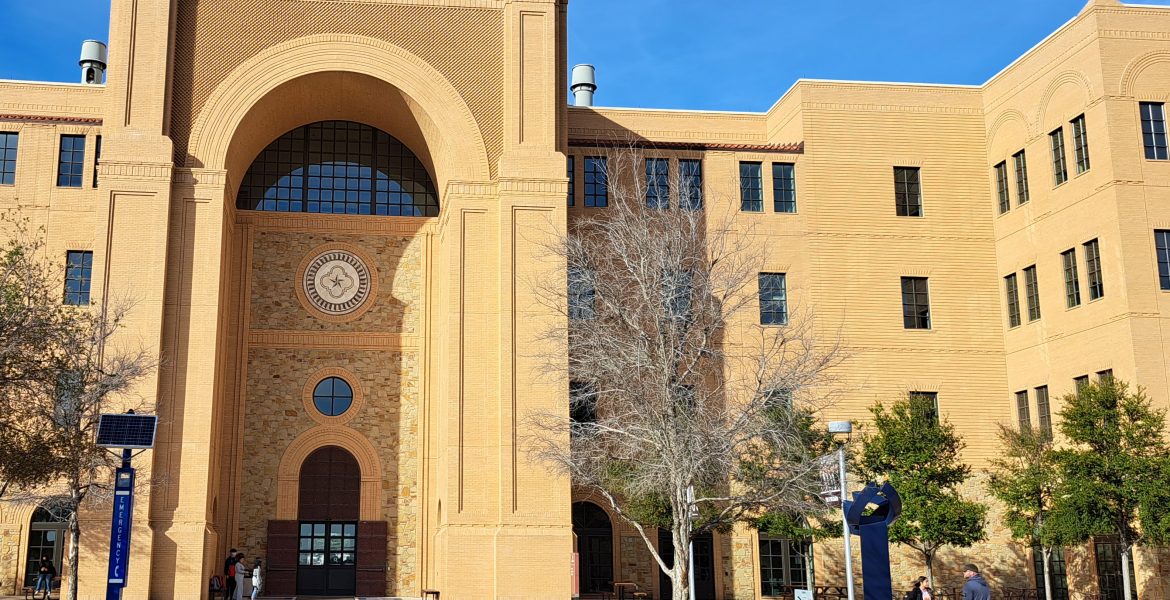The American Dream is a belief in the U.S. that anyone, regardless of where they were born or their economic status, can move up the ladder of success. For many Hispanic students, attending a university to earn a degree is the only way to get there.
Typing away on his computer, Gerardo Chapa, business management junior at Texas A&M University-San Antonio, always knew he would go to college.
“Since I was younger, my parents and teachers would always say, ‘go to college and get an education,’” Chapa said. “That was one of the big things and motivations for me to want to go, and that’s what was kind of told to me since I was younger.”
Like many first-generation Hispanic students, Chapa had to navigate college on his own with little help from his parents. It wasn’t until halfway through his college journey that he started thinking of quitting school.
“I wanted to drop out last semester because I felt like I was being charged for a lot of stuff I had already seen, and I felt like I was just wasting my time,” Chapa said. “My dad kind of talked me back into it and convinced me to stick through, and I am super glad I did because once you start college, no matter how tough it gets, continue. It will get better.”
In the United States, Hispanic student university enrollment rose from 1.5 million in 2000 to about 3.8 million in 2019, but the number of Hispanic students who complete their degrees is extremely low, according to the Pew Research Center. For Hispanic students 18 years of age and older, only 5.63 million earned their bachelor’s degree, compared to 44.35 million white students, according to the 2021 U.S. Census data.
Lack of educational resources and instruction begins in K-12
Among the factors leading to fewer Hispanic students completing their degrees, there is a belief the problem starts with systemic educational failures in K-12.
Adrianna Santos, associate professor of English language, literature and arts at A&M-San Antonio, has studied Latinx literature and societal problems. She believes there is inequality for Latinx students in K-12, leading to a ripple effect on college dropout rates.
“I think you have to look at issues of access and issues of inequality from the very levels of K-12, and the different types of resources and support that students get through their entire educational pipeline,” Santos said. “There is a lack of economic stability, security and access to resources for college prep.”
Lack of access to college prep, such as workshops or tutoring for college-level tests, has led many Hispanic students to not meet the requirements of a 945 score in reading and writing for the Texas Success Initiative, or TSI, which affects students’ confidence in finishing their degrees.
Sonya Barrera Eddy, director of integrated reading and writing and instructional assistance professor at A&M-San Antonio, teaches supplemental TSI classes to fill in gaps that might have occurred in K-12.
“Texas A&M-San Antonio is one of nine universities in the state of Texas that has been given a grant that allows us to waive the TSI requirement, so we are able to use the Multiple Measures to place students,” Eddy said. “Multiple Measures placement is where you look at a student holistically, so you have a better idea if you look at their GPA, past experience, how long they have been in the United States, if all of their high school occurred in the U.S. and how many languages they speak.”
Lack of College preparation in high schools
Eddy said she has seen firsthand a lack of proper educational instruction in high school because many Hispanic students need to take the TSI developmental college-level course in conjunction with ENG 1301.
“It’s almost exclusively people of color in the TSI classes, which tells us there is a problem,” Eddy said.
Students not meeting the TSI requirements leads to their confidence taking a hit, which is an unintentional effect of the exam. When those students enter a university, they already feel they may not be able to get their degrees.
“Think of it like a photo; a single stakes assessment is really a snapshot of your brain at a single moment in time, and it is not a summation of who you are as a human being,” Eddy said. “Success of students placed with Multiple Measures have better success rates, degree persistence and completion than they did with single high stakes tests.”
Paying for college is a problem
According to the Pew Research Center, financial constraints also are a major reason why Hispanic students decided to stop attending a university.
At one point, Jason Rivera, computer information systems sophomore, feared not being able to pay for his education after graduating as salutatorian at Brooks Academy of Science and Engineering’s class of 2021.
“I am using my dad’s military affairs, but before that, I was scared because I didn’t know if I was going to be using the Hazelwood [benefit] because we thought it was going to expire,” Rivera said. “Your stomach is in your chest; it scares you because you have to understand you’re putting down at least $8,000 a year, and that adds up.”
During high school, Rivera was not told he had to apply for scholarships, and he didn’t know where to go to find financial help.
“For me, my parents didn’t know much about college, so they never told me that you yourself have to apply for a scholarship,” Rivera said. “I was nervous and extremely scared because I did all this in high school to be number two, and it’s leading to nothing.”
Cultural stigma toward higher education exists
Both Chapa and Rivera explained how within the Mexican American culture it is believed a large number of students will drop out of college or not go to school because they want to “make money quick” to support their families. Hard manual work is valued more than earning a degree in higher education.
“I think that some Mexican households need to change in a way because hard work doesn’t necessarily mean that you are just working labor every day, you put hard work into school too,” Rivera said. “I mean, my cousin doesn’t go to school because his dad said it was too expensive and he shouldn’t go.”
Eddy, who also is a proud fifth-generation Tejana and a first-generation student, believes changing the educational system is a good place to start.
“I am successful in spite of the education system, not because of the people that created the system 100 years ago,” Eddy said. “They couldn’t imagine me going to college; it wasn’t possible. They set up a system that worked for that time. Fast forward 100 years, and I exist now.”
A common string of advice that current Hispanic students want to give others who feel they want to quit school is to keep going no matter the circumstances because the reward of earning a degree is equivalent to reaching the American Dream.
“College is a key that gives you a ladder that you can climb because other people can’t get up there … they weren’t fortunate enough,” Rivera said. “Apply for as much financial aid as possible because I feel as if people should always say, ‘hey, I can go to school.’”






